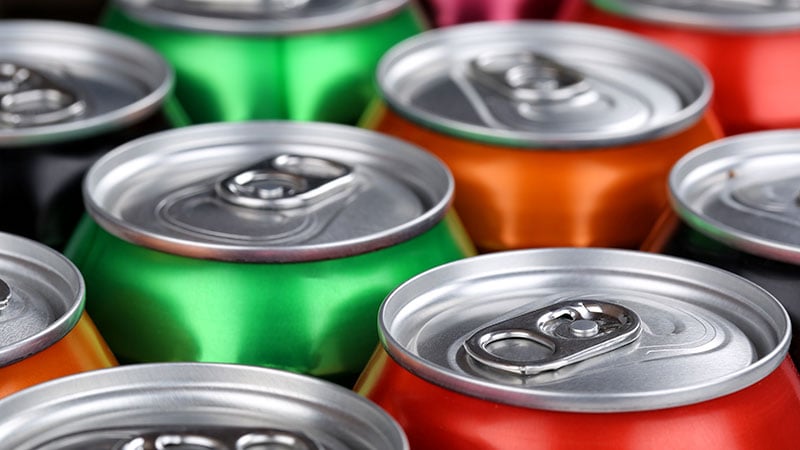Soft drink consumption is linked to a higher risk for major depressive disorder (MDD) and more severe symptoms in women, potentially due to alterations in the gut microbiome, new research showed.
Investigators found that higher soft drink consumption was associated with a 16.7% increased risk for MDD and more severe depressive symptoms in women. This link was significantly mediated by changes in the gut microbiome, particularly an increased abundance of the bacterium Eggerthella, which explained 3.8% of the effect on diagnosis and 5.0% on symptom severity.
 Sharmili Edwin Thanarajah, MD
Sharmili Edwin Thanarajah, MD
“Our findings add to the growing evidence that high intake of sugar-sweetened and artificially sweetened beverages is linked to depression risk and severity, potentially through gut-brain mechanisms,” lead investigator Sharmili Edwin Thanarajah, MD, Department of Psychiatry, Psychotherapy, and Psychosomatics, University Hospital Frankfurt, Goethe University, Frankfurt, Germany, told Medscape Medical News.
“Physicians should consider asking patients about soft drink consumption as part of routine dietary assessment, particularly in those with or at risk of depression, and encourage reducing intake as part of a broader strategy for both physical and mental well-being.”
The results were published online on September 24, 2025, in JAMA Psychiatry.
Overwhelming the Gut
Multiple epidemiological studies have linked soft drink consumption to depression. For example, one US study showed women who regularly consumed soft drinks were 34% more likely to develop MDD after 4 years.
In addition, a meta-analysis of 10 studies involving more than 300,000 individuals also showed increased depression risk with soft drink consumption.
Other studies have shown a link between the gut microbiome and both soft drink consumption and MDD. Research suggests ultraprocessed, high-calorie soft drinks, which are rich in simple sugars like glucose and fructose, can overwhelm the small intestine’s absorptive capacity and promote the growth of specific bacterial genera.
However, because most studies rely on self-reported symptoms, the potential association between clinically diagnosed MDD, the gut microbiome, and underlying mechanisms remain unclear.
“Our goal was to go beyond that and examine possible biological mechanisms that could help explain this link,” said Thanarajah.
The study included 932 participants: 405 patients meeting Diagnostic and Statistical Manual of Mental Disorders criteria for MDD (67.9% women; mean age, 36 years) and 527 healthy control individuals (65.5% women; mean age, 35 years).
The groups were similar in terms of sex and age but differed significantly in BMI and years of education. Mean BMI was 26.04 for the MDD group vs 24.08 for control group, and mean years of education were 13.45 for the MDD group compared with 14.10 for the control group.
Researchers assessed consumption of carbonated soft drinks over the previous year using a validated food frequency questionnaire, with responses ranging from “never” to “several times per day.” They calculated total amount in g and used nutrient composition to estimate the energy intake in kcal.
Strong Association in Women
Higher soft drink consumption was associated with a small, but significant, increased risk for MDD diagnosis in the overall cohort (odds ratio [OR], 1.081; 95% CI, 1.008-1.159; P = .03).
The association was stronger in women who drank larger amounts of soda, who were 17% more likely to have MDD than women who drank less (OR, 1.167; 95% CI, 1.054-1.292; P = .003). There was no significant effect observed in men.
Depressive symptom severity was also linked to soft drink intake, with higher consumption associated with worse symptoms in the overall cohort (P < .001). But this effect, too, was driven by women (P < .001), while men showed no significant effect.
The link between soft drink consumption and MDD diagnosis, as well as symptom severity, remained significant in women after controlling for BMI, antidepressant use, education, and total calorie intake. The relevant effects were not significant in men.
It’s unclear why the relationships are stronger in women, but biological or hormonal differences likely play a role, researchers said. A higher proportion of women in the study may limit interpretation of findings in men, they added.
Soft drinks may raise depression risk through several possible pathways — from blood sugar spikes and microbiome changes to inflammation and even effects on the brain’s reward system, Thanarajah noted.
“It’s probably not one single mechanism but a combination of different pathways mediating the association between soft drinks and depression,” she said.
Higher Gut Bacteria Load
Thanarajah and colleagues had previously identified Eggerthella species (gram-positive, anaerobic bacteria)and Hungatella as causal contributors to MDD.
Eggerthella species, which are typically present at low levels in the healthy gut microbiome, have been consistently linked to MDD but not to antidepressant use, researchers noted.
To extend this work, researchers analyzed stool samples to assess the effect of soft drink consumption on the gut microbiota, focusing on Eggerthella and Hungatella species.
In women, soft drink consumption was significantly associated with higher Eggerthella abundance (P = .007) but not Hungatella (P = .57). Again, this pattern remained the same after controlling for BMI and antidepressant use, and there was no significant association in men.
Results revealed that higher levels of Eggerthella in the gut mediated the association between soft drink consumption and MDD diagnosis in women (mediation effect; P = .01), explaining 3.82% of the total effect of soft drink consumption on MDD risk and 5% of MDD symptom severity. Mediation effects remained significant after controlling for BMI (P < .05). In addition, when controlling for total calorie intake, all reported significant effects remained statistically significant (P < .05) across analyses.
Small, but Important Effect
Soft drinks appear to have a unique impact on the gut, Thanarajah said.
“Unlike solid food, soft drinks deliver a rapid influx of sugar or sweeteners to the colon, which can quickly elevate blood sugar levels, reach the brain, and also promote the growth of gut bacteria with pro-inflammatory properties,” she explained.
Some of these drinks contain artificial sweeteners, such as aspartame and saccharin, which may also disrupt gut microbial balance. While there was no clear difference between sugar- and artificially-sweetened soft drinks in this study, the researchers noted that the analysis wasn’t designed to tease that apart.
“More detailed research is needed to understand whether the type of sweetener matters,” said Thanarajah.
Although the effect sizes in the study were small, soft drinks are so widely consumed that even modest risks can add up to a major public health concern, she added.
The study findings support public health policies limiting soft drink availability and marketing, such as taxing sugar-sweetened beverages, restricting school sales, and regulating advertising to youth, the investigators noted.
The analyses, which were based on a mediation model, can’t infer a causal relationship between soft drink intake and depression. Another potential study limitation was that researchers couldn’t meaningfully control for anxiety even though MDD and anxiety are often comorbid (31% of this study’s patients with MDD also had anxiety).
Reliance on self-reported dietary intake using food frequency questionnaires may also introduce bias, researchers noted. And the data couldn’t assess the effects of sugar-sweetened vs artificially-sweetened soft drinks due to recall challenges and unclear labeling.
Novel Findings
Commenting for Medscape Medical News, Uma Naidoo, MD, director of Nutritional and Lifestyle Psychiatry at Massachusetts General Hospital and instructor in the Department of Psychiatry at Harvard Medical School, both in Boston, noted that the study is the first to show that the link between higher soft drink consumption and depression is significantly mediated by changes in the gut microbiome, specifically an increased abundance of the genus Eggerthella.
“The study provides a mechanistic pathway that was not previously established in human clinical cohorts,” said Naidoo.
The fact that the soft drink-depression link was mediated through the gut microbiome only in women is consistent with research on the “microgenderome” suggesting that gut microbiota may interact with sex hormones investigating the concept of that proposes gut microbiota may interact with sex hormones, said Naidoo.
She noted multiple studies have demonstrated women are more vulnerable to gut microbiota-driven neuropsychiatric effects, including those mediated by pro-inflammatory taxa such as Eggerthella.
She added epidemiological data consistently show women are more susceptible to depression and that dietary risk factors, including soft drinks and ultraprocessed foods, have a greater impact on depression risk in women than in men.
Naidoo agreed that the study supports integrating dietary assessments and counseling into depression prevention and treatment strategies. However, she added that further research — including randomized controlled trials and mechanistic studies — is needed to refine intervention strategies as well as to confirm causality.
This study received funding from the German Research Foundation. Thanarajah reported receiving advisory board fees from Janssen during the conduct of the study. Naidoo had no relevant conflicts of interest.

